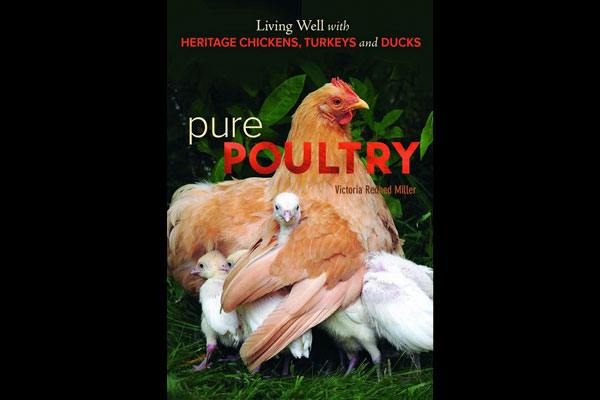From a turkey who likes to dance to chickens who forage, Sequim author Victoria Redhed Miller finds life on the farm to be just ducky.
The former Seattleite, now off-the-grid Sequim farmer, released her how-to guide for raising heritage poultry “Pure Poultry: Living Well with Heritage Chickens, Turkeys and Ducks” late last year.
The memoir of her first years raising heritage chickens, turkeys and ducks also serves as a how-to for raising heritage breeds.
“It’s written entirely from our own experience starting from when we were absolute beginners. I’m quite candid about mistakes that we made along the way,” she said. “I think anyone even if they don’t raise poultry or don’t want to will enjoy reading ‘Pure Poultry.’”
When she started raising poultry, Redhed Miller found few resources on raising heritage breeds. Her book is the first in about 100 years focusing only on heritage breeds.
“I was quite ignorant and it took me a while to figure out what the advantages of heritage breeds were, but once I did, it was an easy decision for us to stick with heritage types,” she said.
Redhed Miller, formerly a freelance database designer and antique repair/restoration specialist, said the phrase “heritage” is misleading as it implies an old or heirloom breed or species.
“The technical difference is, a heritage breed comes from genetically similar parents, a hybrid comes from genetically dissimilar parents,” she said.
Through her research, Redhed Miller finds heritage breeds more sustainable because you can breed them true to type and they are more inclined to forage some of their food. She said the second part is especially important since they live off the grid and don’t use electric incubators.
“Pure Poultry” includes simplified guidelines for housing, breeding, caring, processing, cooking and preserving heritage poultry whether you live on a farm, have a small backyard or a neighbor with space to share.
Through her research, Redhed Miller said she’s convinced much of the learning process is trial-and-error.
“There is something unique about each person’s circumstances that necessitates learning a certain amount strictly by experience,” she said. “For example, your predator issues might be different from mine. You might work all day away from the farm … So I always tell people that starting by reading a book or a blog is a good idea, but at a certain point you have to put down the book and have at it and figure out what really works for you.”
Local impact
Redhed Miller and her husband David’s poultry eggs are mainstays while in season at establishments like Alder Wood Bistro, The Red Rooster Grocery, Sunny Farms, Nash’s Organic Produce and the Dungeness Valley Creamery.
Their first partnership was with Gabriel and Jessica Schuenemann, owners of Alder Wood Bistro, in 2008.
After receiving their egg dealer’s license, they’ve provided organic chicken and duck eggs to the business ever since. Production is typically highest in the spring.
However, Redhed Miller said they are not expanding due to the eggs being seasonal.
“Everyone seems to love our eggs, especially the duck eggs because they are not easy to find around here, but we are slowly educating our customers that eggs are actually a seasonal product,” she said.
“The birds slow down or stop laying in the fall during the annual molt, and thankfully this happens at a time when business is also slowing down.”
She recommends the Bistro’s Creme Brûlée, and its flourless gluten-free brownie, called Chocolate Bliss.
However, Redhed Miller recommends those with egg allergies should talk to their doctor to see if they can try duck eggs.
For more on Redhed Miller, visit her blogs at potpiesandeggmoney.blogspot.com or http://canyoncreekfarms.blogspot.com.



